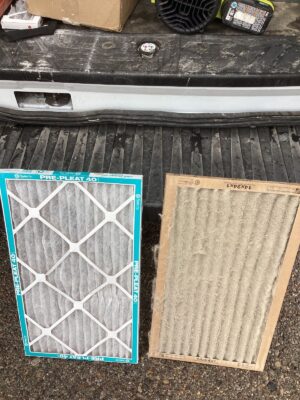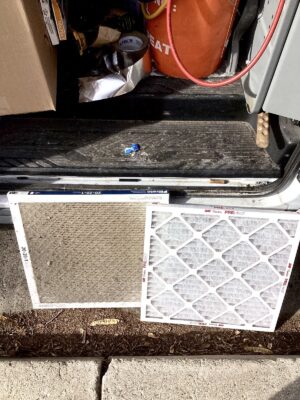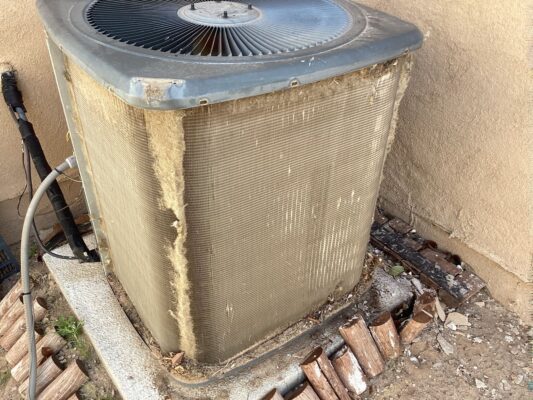An abundant variety of beautiful flora surrounds us in the Rio Grande Valley. Sometimes all of the plant life of the bosque can be a struggle because of falling leaves, seeds, and critters that can wreak havoc on your HVAC system.
The good news is that these problems tend to be predictable. Every summer, cottonwoods drop their fluffy white seeds for about three weeks. These seeds (which resemble cotton), float through the air and then pile up on the ground. This phenomenon is often called “summer snow.”
Cottonwood Seeds in Your Coils
The problem with cottonwood seeds is they can easily attach themselves to your air conditioner coils. One or two seeds probably won’t cause a problem, but cottonwood seeds tend to pile up in heaps. Lots of fluffy seeds stuck to your condenser coils causes reduced airflow. This means the system has to work harder to produce the same amount of cool air. This can inflate your energy bills.
Besides making the system less efficient, clogged coils can also keep the system from expelling heat effectively. All of this can put a strain on the system components and lead to an overheated compressor. This can mean costly repairs and replacement parts.
Preventative HVAC Maintenance
Here in the Rio Grande Valley, cleaning cottonwood seeds out of your coils should be part of your regular maintenance. While it is possible to do this yourself, there’s a high risk of embedding the seeds even deeper. A professional HVAC technician will have the right equipment to make sure this doesn’t happen.
A professional HVAC tech can help with the following:
- Changing air filters. This should be done every 30 to 90 days.
- Removing debris from units. Regularly inspect the outside of your unit to keep leaves, twigs, and other things at least two feet away.
- Inspect refrigerant lines. This should be done monthly. A HVAC tech will check for leaks and worn out lines and make sure they haven’t detached from the unit.
- Keep the unit leveled. Make sure it hasn’t shifted and become tilted.
- Check fan blades. Every other month, look at the fan blades while they’re stopped and when they’re moving. An HVAC tech will notice any damage and listen for strange noises.


Dirty air filters

Dirty coils
Professional HVAC Maintenance
Having your HVAC system serviced every six months may sound like a big cost. But in the long run, regular checkups on the system will save money by keeping your system running efficiently. It will also reduce the risk of needing high-cost major repairs.
Each component of the system needs to be checked by an HVAC professional at least once a year:
- Refrigerant. This needs to be at the correct level and will probably only be checked once. These levels stay the same unless the system springs a major leak.
- Thermostat. This needs to be calibrated once a year (typically in the fall).
- Mechanical parts. These components should be checked every six months, at the beginning of every new heating or cooling season.
- Coils. Both the indoor and outdoor coils should be cleaned at least once a year.
- Electrical components. This includes wires, connections, terminals, and fuses. These should be checked anytime you have routine maintenance done.
Signs of a Problem
Signs that your air conditioning unit is struggling tend to be pretty obvious:
- Air that’s not cold enough
- A shrieking noise coming from the fan motor
- Water leaks
- Nearby water damage
- A musty or moldy smell
- The system doesn’t turn on or it shuts down
If you notice any of these things, your system needs immediate attention from an HVAC professional.
How Aztec Mechanical Can Help
Cottonwood seed season is nearly here, and we’re experienced with the challenges this can cause to an HVAC unit. Schedule an inspection with us as soon as you see fluffy seeds start piling up in your yard. Our experienced techs will make sure your air conditioning unit is running in tip-top shape as the summer temperatures heat up.

